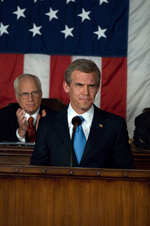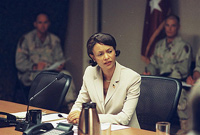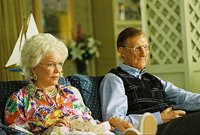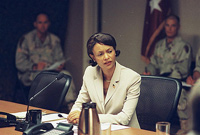Though director Oliver Stone is no stranger to presidential biopics (JFK, Nixon), W. is his first film to tackle the subject of a sitting U.S. president, a fact that has drawn the ire of more than one critic. Isn’t history written best with some distance and perspective? Bush is one of the most controversial presidents ever, after all, so couldn’t Stone have waited a few years to give him a proper cinematic treatment (as he did with World Trade Center)?
W., however, does not aspire to write history, and it’s not all that concerned with verisimilitude. Rather, it is a film about the George W. Bush mythos—a pop-art deconstruction of the larger-than-life, made-for-the-movies figure of “Dubya” that has loomed large over the world for the past eight years. And for what it is, W. is brilliant.

Recognizing the sheer immensity of the Bush narrative, Stone wisely chooses to focus W. on select moments in his life and presidency. The narrative is structured so that we jump back and forth between Bush’s first term in office (roughly the 2002-2003 lead-up to the Iraq War) and his life before 1994 (when he was elected Governor of Texas). It is a testament to the thrifty script by Stanley Weiser (Wall Street) that a hyper-complicated president like Bush can be reduced—and, in some ways, understood—in the short span of two hours and eleven minutes.
The strength of the film is not necessarily its accuracy—though it seems true to Bush’s life, Stone wasn’t working for the fact-checking police—but that it artfully tells a compelling story. W is more Greek tragedy than political satire, more American Freudian fable than historical biopic. It is a flawed, patriotic mess of a movie that nevertheless feels familiar and comfortable, almost therapeutic. And as the piano refrain of “The Yellow Rose of Texas” repeatedly reminds us (as does the music of Alan Jackson, Willie Nelson, Gene Autry and Bob Dylan), W. is also endearingly American.
The first—and most surprising thing—that you’ll notice about W. is that it is an empathetic, humane, some might even say favorable rendering of President Bush. Coming from Oliver Stone, this is something of a shock. Audiences might expect an utter and complete skewering of the president, and many will be disappointed. “W” (also known as “Junior” or “Bushie”) comes across less as a villain and more like your average American man-boy—mischievous, immature, but ultimately quite principled and compassionate. He’s somewhere between Tom Sawyer and Jay Gatsby—an American icon never quite comfortable in his own skin, always on the lookout for affirmation from others, yet unswervingly (if perhaps recklessly) devoted to whatever goal or green light is currently registering on his radar.

The chief irony of the film is that it is a very domestic story—ultimately about family and faith—and yet it plays out on the biggest of all stages: the American presidency. Stone seems to take special joy in juxtaposing Dubya’s folksy “Don’t mess with Texas” cowboy simplicity with the “making decisions that have world impact” gravitas of his job. It’s fun to watch Bush at his Crawford ranch, for example—leading a brigade of his closest advisors (Rummy, Condi, Rove, etc.) on a sort of “foreign policy nature hike” where Iraq battle strategies are formulated. Or there is the affable impertinence with which he chats about war policies with Dick “Vice” Cheney while stuffing his face with a ham-on-Wonder bread sandwich and Cheetos. These moments remind us why Bush is so extremely polarizing; he is often simultaneously endearing and maddening, depending on who you ask.
One of the most impressive things about Stone’s treatment of George W. Bush is the complex respect given to the president’s Christian faith. The film is, in a way, a tale of his spiritual journey, from hard-drinking, aimless party boy to devout evangelical Christian. Though many details are left out of the story (such as Billy Graham’s role in Bush’s decision to come to Christ), the overall spirit of it feels more or less accurate. Bush’s conversion scene—hinging on an affable Texas minister named Earle reading John 3:16—feels as or more honest than any Christian-made film I’ve seen. It would be easy to insinuate that Dubya used religion as a political convenience, and this is certainly implied (“I will never be out-Christianed again,” Bush tells a friend after he loses his 1978 bid for congress). But in the careful hands of Josh Brolin, Bush’s faith gets the nuanced treatment it deserves.

Brolin—an actor who has catapulted to star status in the last year (thanks to a brilliant turn in the Oscar-winning No Country for Old Men)—perfectly captures Bush’s awkward physical and verbal presences, but also his endearingly accessible (and privately complicated) personality. Particularly in his early romantic interactions with Laura Bush (the impressive Elizabeth Banks), we can see why “Geo” has charmed so many people throughout his private and public history.
Though Brolin is the star of the show, the actors who fill out the impressive ensemble cast are also extremely fun to watch. James Cromwell as the elder George Bush—W’s dad—is particularly effective, offering the contrast and foil to Dubya and the focal point of much of the drama that unfolds. Richard Dreyfus aptly portrays the film’s most villainous character—Dick Cheney—as the hawkish puppetmaster of the whole Iraq scheme, in contrast with Jeffrey Wright’s Colin Powell, who is portrayed as the skeptical voice of reason who nevertheless does not break ranks in the march to war.
Some of the other supporting actors are less convincing, particularly Thandie Newton as Condoleezza Rice. Her portrayal of the Secretary of State is 100 percent over the top parody, with little in the way of humane empathy. Toby Jones as Karl Rove is also a tad on the caricature side of things. “The Architect” is portrayed here as a surreptitious, Blackberry-dependent, behind-the-curtain wizard with no conscience but an unstoppable political will. Who knows, though. Maybe that’s accurate.

At the end of the day, the impressive supporting players are only just footnotes in the W. story. For good or ill, the man at the center is what this saga is all about.
The film opens and closes with Bush standing alone in an empty baseball stadium, perhaps imagining that his life had taken a different path (as it is, he came close: he once owned the Texas Rangers). These scenes demonstrate the film’s overarching thematic question: what would it have been like—for Bush, and for the world—if he had never become president? His ascent to becoming the leader of the free world is consistently portrayed in the film as being largely out of his hands, a foregone conclusion helped along by family money, pedigree, and connections. “You’re a Bush,” H.W. (“Poppy”) reminds his son early in the film. And like it or not, that means president.
Though W is certainly flawed and overly simplistic, it also feels strangely authentic. Whether it’s an emotional scene of the whole Bush family watching the televised election returns in 1992 (when Clinton upset the elder Bush’s bid for a second term), or an intimate moment in the White House when Laura reassures her prematurely-wrinkled husband that “someday the war will be over, and we can have our lives back,” there is a surprising amount of tenderness in the film.
Loathed, reviled, and resented as they are, the Bushes are real people, with all the hang-ups and baggage and neuroses that anyone has. Stone’s incendiary realization was that W. would be most provocative, most interesting, and ultimately—for a nation that needs to forgive and move on—most helpful, only if it sought to truly understand its subject. In a partisan election season where any and all personal faults are turned into salacious attack ads, it’s reassuring to see that Oliver Stone, typically the most salacious of them all, is willing to exercise some restraint.
Talk About It
Discussion starters- Does W. feel like an honest and fair portrayal of George W. Bush?
- What do you make of the scene where Bush tells pastor Earle that he feels called to the presidency because “something big” is going to happen? Is he prophetic? Or is Oliver Stone insinuating some sort of conspiracy theory?
- Who, if anyone, does the film blame for the Iraq war decision?
- How do you think George W. Bush’s faith impacted him in his presidency?
The Family Corner
For parents to considerW. is rated PG-13, mostly for language. There is some discussion of sex, but no sex of nudity happens onscreen. There are a few scenes of war violence, but nothing too graphic. The main concern for parents might be the pervasive alcohol usage and smoking that Bush engages in as a young man. After all, parents might have a hard time explaining that this guy became president. Otherwise, W. presents an interesting and provocative film with a wide array of discussion topics for the whole family.
Photos © Copyright Lionsgate
Copyright © 2008 Christianity Today. Click for reprint information.












